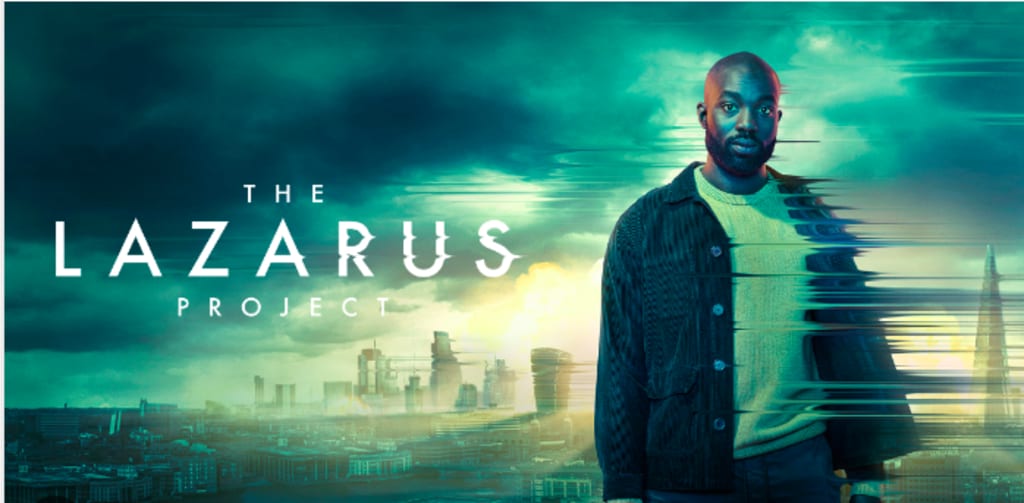Review of 'The Lazarus Project' Season One
Time Travel Done Superbly Right

So, a friend in the UK -- James Harris -- who knows how much I enjoy time travel stories (as a reader, a viewer, a reviewer, and an author) recommended The Lazarus Project, and sent me a link to a trailer, for its second season. I figured before I watched even a trailer for the second season, I might as well watch the first season, which I just did -- and thought it was brilliant -- and then discovered that although the second season debuted in the UK this month, it has not yet made it over to this side of the Atlantic. Why TV series can't be released at the same time all around the world, I have no idea. But rather than keep complaining about that, I thought I'd tell you why I not only think the first season of The Lazarus Project (which I binged on TNT) is brilliant, but the best time-travel series I've ever seen on television, bar none.
[And there may be some slight spoilers ahead, but I'll try to be as general as possible.]
First, the ambience was great, reminiscent of Utopia (the UK version), and its unique mix of gravity and humor, life-and-death situations leavened with nonchalance. But it's the story, and the attention it gives to consequences of time travel, that puts it on the very top.
Here's the set-up, which I'll enumerate to make as clear as possible:
1. There's a time travel process -- not a "machine" per se, but some kind of process, which isn't quite revealed -- that sets time back to 12 midnight, July 1, from whatever time the process is invoked in the subsequent year. So, if the switch or whatever is flipped right now, our world would go back to 1 July 2023. And we and just about everyone in the world would be doing whatever we were doing on that midnight.
2. Just about everyone in the world has no idea that this, the reversal in time, is happening. We have no idea we're going through this time a second, third, or who knows how many times. But a very few people -- mutants -- are aware of this Groundhog syndrome, and a serum has been invented/discovered which opens up the awareness of a few other people to the repetitions in time.
3. Numbers 1 and 2 above are the basis of the Lazarus Project, which seeks to protect the world or least we humans in the world from extinction events. And the head of the Lazarus Project -- at least as far as we know -- gives the order to invoke the time shift.
4. But remembering the lost time is a heavy burden, which can become excruciating in all kinds of ways. A baby born during a year that is later erased won't exist after rollback. Imagine how the parents who remember that year -- parents who are in the Lazarus Project -- would feel. Or, if you lost any loved one during that year, you might well want the time set back as soon as possible, to give you a chance to do something to prevent that death.
5. But the problem is the Lazarus Project also has a principle of setting time back as infrequently as possible, and only to derail mass extinction events. To give an example that's mentioned early in the narrative -- September 11, 2001 didn't qualify, as terrible as it was. But COVID did, and the speed with which the vaccines were rolled out in our reality is cleverly explained as due to the Lazarus Project buying more time by literally setting time back, giving microbiologists as much time as they needed to come up with the vaccines.
But ok, I'm coming close to spoiler territory, so I'll just also tell you the acting and production were excellent, and creds to Joe Barton who wrote the narrative. I'll leave you with this recommendation: if you're a fan of time travel, see The Lazarus Project. Not only will you not be disappointed, you'll be glued to the screen and thrilled. And the good news is that if you want to see it again, you won't need some kind of switchback in time to do that.
About the Creator
Paul Levinson
Novels The Silk Code, The Plot To Save Socrates, It's Real Life: An Alternate History of The Beatles; LPs Twice Upon A Rhyme & Welcome Up; nonfiction The Soft Edge & Digital McLuhan, translated into 15 languages. Prof, Fordham Univ.






Comments
There are no comments for this story
Be the first to respond and start the conversation.